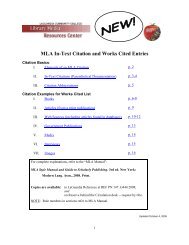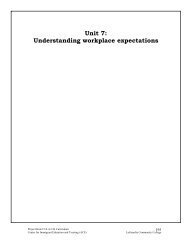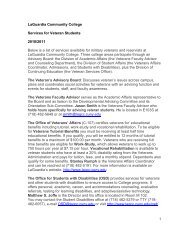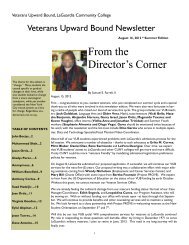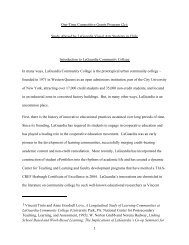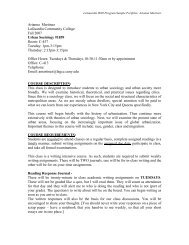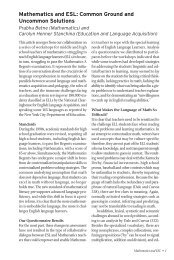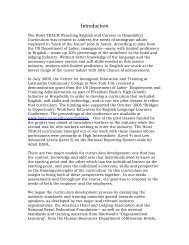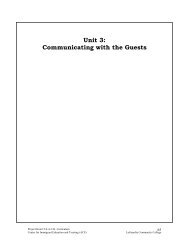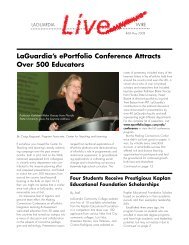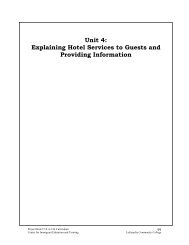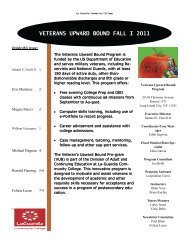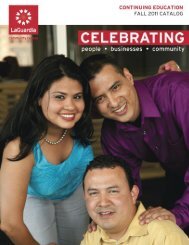COURSE INDEX - LaGuardia Community College
COURSE INDEX - LaGuardia Community College
COURSE INDEX - LaGuardia Community College
Create successful ePaper yourself
Turn your PDF publications into a flip-book with our unique Google optimized e-Paper software.
Mathematics, Engineering, and Computer Science Department<br />
undergraduate research papers. Students will formulate search<br />
strategies, evaluate critically their results, modify searches accordingly,<br />
and address the ethical, legal, and social issues related to the<br />
use of information.<br />
Prerequisite: CSE099, ENA/ENG/ESA099/ENC101<br />
LRC104, Information in a Globalizing World<br />
2 credits; 2 hours<br />
The growing interconnectedness of the world and the pervasiveness<br />
of the Internet have created an ease of access to all types of<br />
global information sources. In an international context of often<br />
contradictory opinions and ideas, retrieval and evaluation of information<br />
have become more complex. This course will teach students<br />
how to access and to evaluate information critically in order<br />
to engage with diverse perspectives of 21st century global issues.<br />
Prerequisite: ENC/ENG101<br />
Mathematics, Engineering and<br />
Computer Science Department<br />
Room E218 (718) 482-5710<br />
The Mathematics Department offers a great variety of courses<br />
to students at all levels: from basic arithmetic and algebra to<br />
linear algebra, calculus and differential equations. From these<br />
courses, students gain skills and confidence for advanced work<br />
while learning to apply their course work to other disciplines.<br />
Department Faculty<br />
Kamal Hajallie, Chairperson; Mercedes Acosta, Sreedevi Ande,<br />
Yelema Baishanski, Abderrazak Belkharraz, Andrew Berry,<br />
Prabha Betne, Denise Carter, Dmitriy Chebanov, Steve Cosares,<br />
Gordon Crandall, Marina Dedlovskaya, Walter DeLaTorre,<br />
Hendrick Delcham, Abdou Drame, Anthony Giangrasso, Luis<br />
Gonzalez, Yasser Hassebo, Omar Ait Hellal, Alejandro Ibanez,<br />
Jerry Ianni, Reem Jaafar, Abdelhamid Kadik, Mangala Kothari,<br />
Mahdi Majidi-Zolbanin, , Rudy Meangru, Gerald Meyer, Natalia<br />
Mosina, Lawrence Muller, Marina Nechayeva, Yves Ngabonziza,<br />
David Peled, Jorge Perez, Yvonne Powell, Zahidur Rahman, Luis<br />
Rizo, William E. Rosenthal, Kourosh Tavakoli, Yvens Valere, Frank<br />
Wang, Paul West, Dong Wook Won, Gene Yao, Shenglan Yuan,<br />
Svetoslav Zahariev<br />
Computer Courses<br />
MAC101 Introduction to Computer Science<br />
3 credits; 4 hours (3 lecture, 1 lab)<br />
In this first course in the computer science program, emphasis will<br />
be placed on algorithmic design. Basic concepts such as selection<br />
statements, loops, character strings, arrays, pointers and file processing<br />
will be taught. Students will be required to write several<br />
programs in an appropriate language.<br />
Prerequisite: CSE099, MAT200<br />
Pre- or Corequisite: ENA/ENG/ESA099/ENC101<br />
MAC109 Introduction to Visual Programming<br />
3 credits; 4 hours (3 lecture, 1 lab)<br />
This course introduces Windows and GUI concepts and applications<br />
through objects and programming. Students will learn to<br />
develop real-world Windows applications through an event-driven<br />
language, such as Visual Basic. Additionally, students will learn<br />
basic programming concepts such as arithmetic operations, logical<br />
operations and interactive structures.<br />
Prerequisite: BTC100 or BTC101 or MAC101<br />
MAC110 Systems Analysis and Design<br />
3 credits; 4 hours (3 lecture, 1 lab)<br />
This course introduces the student to the analysis and design of<br />
computer-based systems with consideration given to organizational<br />
structures, form design, file design, data structures, scheduling,<br />
operations research techniques, and hardware and software<br />
organization. Actual and simulated case studies will be utilized.<br />
The student will develop and program a prototype and document<br />
a comprehensive systems study.<br />
Prerequisite: ENC/ENG101, MAC109 or MAC195 or MAC196<br />
MAC125 Advanced C/C++ Programming<br />
3 credits; 4 hours (3 lecture, 1 lab)<br />
This course presents object-oriented algorithmic problem solving<br />
using C++. Topics include pointers and pointer arithmetic, linked<br />
lists, memory management, recursion, operator overloading, inheritance<br />
and polymorphism, stream and file I/O, exceptions and<br />
exception handling, templates and STL, applications of simple<br />
data structures and testing and debugging techniques.<br />
Prerequisite: MAC101<br />
MAC190 Object-Oriented Programming<br />
4 credits; 5 hours (4 lecture, 1 lab)<br />
This is the second programming course in the Computer Science<br />
Program. The focus of the course will be object-oriented programming.<br />
Topics include constructors, superclasses, subclasses,<br />
strings, graphics, threads, polygons, inheritance, composition and<br />
method overloading. Writing programs to implement user defined<br />
classes will be required.<br />
Prerequisite: MAC101<br />
Pre- or Corequisite: MAT200 or MAT241<br />
MAC195 Structured Programming with COBOL<br />
4 credits; 6 hours (4 lecture, 2 lab)<br />
Algorithms discussed in this introductory course will be coded in<br />
COBOL. A structured approach will be stressed in the analysis of<br />
control break logic, sequential file updates, random file processing,<br />
ISAM programs, table handling and subprogram linkage.<br />
Prerequisite: BTC100 or BTC101 or MAC101<br />
157



